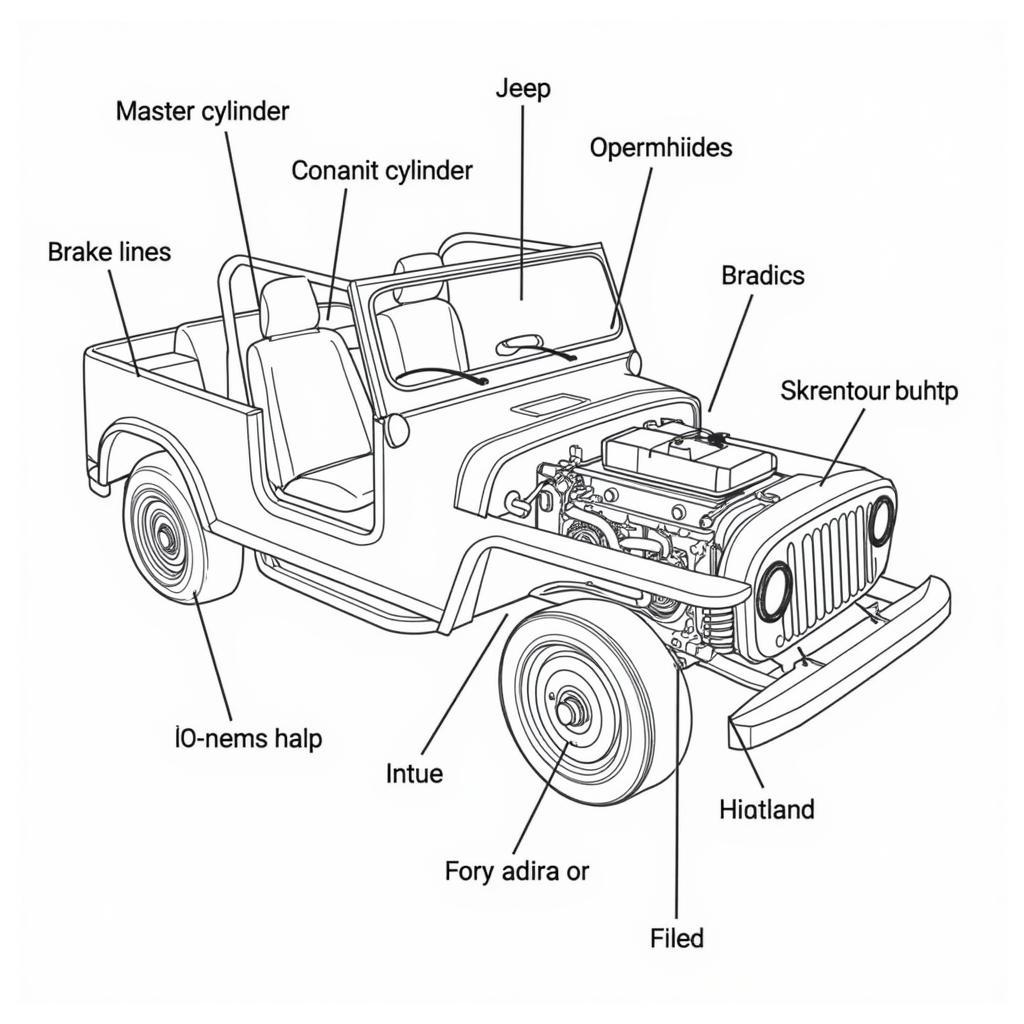The sudden illumination of your Jeep’s brake warning light can be a jarring experience. This light, a stark reminder of your vehicle’s braking system, signals a potential issue that needs immediate attention. Ignoring it could compromise your safety and lead to costly repairs down the line. This comprehensive guide delves into the common causes of a brake warning light on Jeeps and provides insights into diagnosing and addressing the underlying problems.
Decoding Your Jeep’s Brake Warning Light
While the brake warning light itself might seem straightforward, understanding its various behaviors can provide valuable clues. Here’s what you need to know:
- Solid Light: A continuously illuminated brake warning light generally indicates one of two things:
- Low Brake Fluid: This is the most common culprit. Brake fluid, responsible for transmitting force to the brakes, can decrease over time due to leaks or wear and tear.
- Engaged Parking Brake: It might seem obvious, but a simple oversight like forgetting to disengage the parking brake can trigger the warning light.
- Flashing Light: A flashing brake warning light often signifies a more serious issue, usually related to the Anti-lock Braking System (ABS). This system prevents wheel lockup during hard braking, and a fault can compromise vehicle stability.
Common Culprits Behind a Jeep Brake Warning Light
Several factors can trigger a brake warning light in your Jeep. Identifying the root cause is crucial for effective troubleshooting:
1. Brake Fluid Loss
As mentioned earlier, low brake fluid is the most frequent offender. Leaks can occur in the master cylinder, brake lines, or calipers.
Expert Insight: “Always check your brake fluid level as part of your regular vehicle maintenance. A small leak can quickly escalate into a major problem,” advises John Miller, a senior automotive technician with over 20 years of experience.
2. Worn Brake Pads
Brake pads, responsible for creating friction against the rotors to stop your vehicle, have a limited lifespan. As they wear down, the brake fluid level in the master cylinder decreases, potentially triggering the warning light.
3. Faulty Brake Sensors
Modern Jeeps are equipped with brake pad wear sensors that alert you when the pads need replacement. A malfunctioning sensor can send a false signal, causing the warning light to illuminate even if the pads are in good condition.
4. ABS Issues
A flashing brake warning light often points to a problem within the ABS, such as a faulty wheel speed sensor or a malfunctioning ABS module.
5. Electrical Malfunctions
Like any electrical system, the wiring and connections related to your Jeep’s braking system can experience issues. A short circuit, loose connection, or faulty brake light switch can all trigger the warning light.
 Components of a Jeep Brake System
Components of a Jeep Brake System
Troubleshooting Your Jeep’s Brake Warning Light
Before heading to a mechanic, you can perform some basic checks to try and pinpoint the issue:
1. Check Your Parking Brake
Ensure your parking brake is fully disengaged. Sometimes, even a slight engagement can trigger the warning light.
2. Inspect Your Brake Fluid
Locate your Jeep’s brake fluid reservoir (refer to your owner’s manual if unsure) and check the fluid level. If it’s below the “MIN” mark, add the recommended brake fluid type until it reaches the “MAX” line.
jeep patriot brake warning light
3. Examine Your Brake Pads
While visually inspecting your brake pads requires some mechanical know-how, it’s a good idea to check them for excessive wear. If they appear thin, it might be time for a replacement.
4. Listen for Unusual Noises
Unusual sounds while braking, such as grinding or squealing, can indicate worn brake pads or other issues within the braking system.
When to Seek Professional Help
If you’re uncomfortable performing these checks or if the warning light persists, it’s crucial to seek professional help immediately. Driving with a potential brake problem can be extremely dangerous.
e parking brake warning light on jeep renegade
Preventing Future Brake Warning Light Issues
While some brake problems are unavoidable, proactive maintenance can significantly reduce the risk:
- Regular Brake Fluid Checks and Changes: Follow your Jeep’s recommended maintenance schedule for brake fluid flushes and replacements.
- Timely Brake Pad Replacements: Don’t wait for your brake pads to wear down completely before replacing them.
- Thorough Inspections: During regular maintenance checks, have a mechanic thoroughly inspect your entire braking system for any signs of wear, leaks, or damage.
jeep brake warning light stays on
Conclusion
A glowing brake warning light in your Jeep is a serious matter that should never be ignored. By understanding its causes, performing basic troubleshooting, and seeking professional help when needed, you can ensure the optimal performance and safety of your Jeep’s braking system. Remember, when it comes to brakes, erring on the side of caution is always the best approach.
FAQs:
1. Can I drive my Jeep with the brake warning light on?
It’s highly discouraged. Driving with a potential brake problem can be dangerous.
2. How much does it cost to fix a brake warning light issue?
The cost varies widely depending on the underlying cause, ranging from a simple brake fluid top-up to more complex repairs like replacing a faulty ABS module.
jeep wrangler brake warning light
3. How often should I check my Jeep’s brake fluid?
It’s a good practice to check your brake fluid level at least once a month and more frequently if you notice any changes in brake performance.
4. Can I add any brake fluid to my Jeep?
No, always use the brake fluid type specified in your Jeep’s owner’s manual. Using the wrong fluid can damage your braking system.
2001 jeep wrangler brake warning flashing and abs light on
5. How long can I drive with worn brake pads?
It’s unsafe to drive with worn brake pads. If you suspect your brake pads are nearing the end of their lifespan, have them inspected and replaced immediately.
